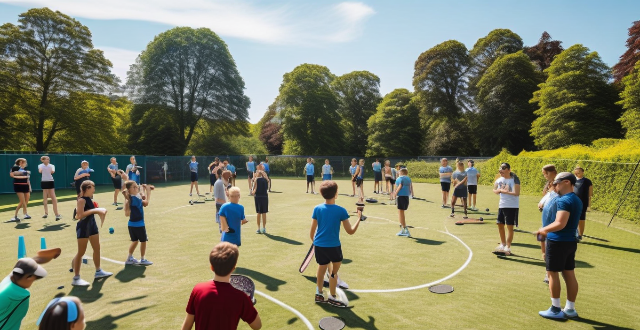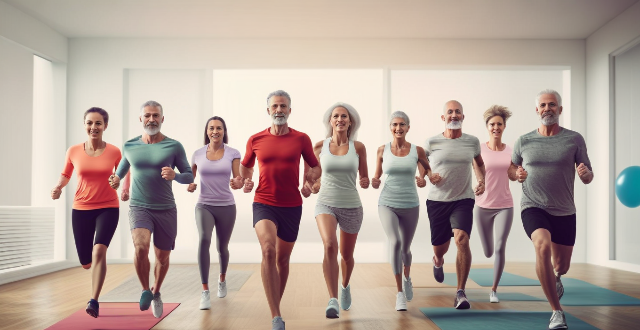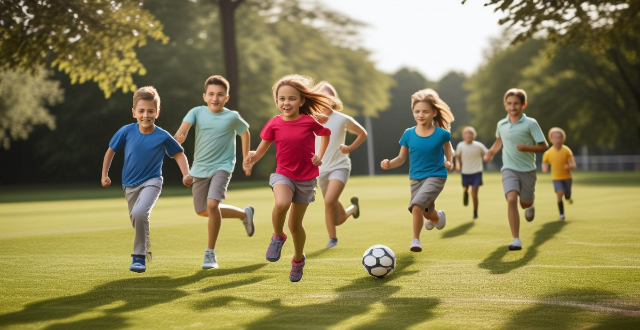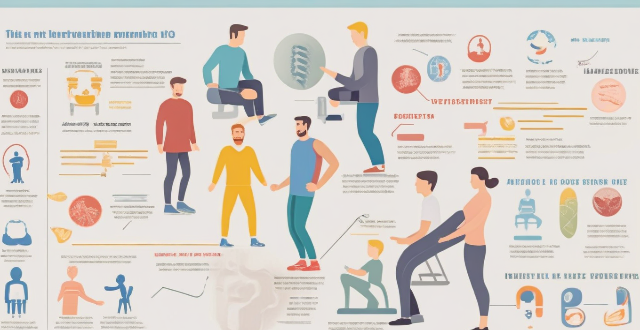Cognitive Sports

Can team sports or group exercises provide additional cognitive benefits compared to individual activities ?
Team sports and group exercises provide cognitive benefits such as improved social skills, enhanced cognitive functioning, increased self-esteem and confidence, and personal growth opportunities. Participating in these activities helps individuals develop strong communication skills, cooperation, conflict resolution abilities, attention and focus, decision making skills, memory retention, and a sense of achievement. These skills can be applied in all aspects of life, leading to personal growth and development.

How does sports education impact academic performance and cognitive abilities ?
Sports education has a positive impact on academic performance and cognitive abilities by improving attention, concentration, learning abilities, reducing stress levels, enhancing time management skills, and increasing discipline and responsibility.

How does exercise improve cognitive function ?
Exercise plays a crucial role in enhancing cognitive function, including memory, attention, and problem-solving skills. It promotes brain plasticity, increases blood flow and oxygenation, reduces inflammation, and improves sleep quality. Incorporating exercise into your routine can be done through various activities such as running, swimming, or yoga. Start small and gradually increase intensity and duration, find enjoyable activities, incorporate mindful movement, make it social, set realistic goals, and consult with a professional if needed.

Does exercise have different effects on cognitive function at different ages ?
This article explores the relationship between exercise and cognitive function across various age groups. It highlights the benefits of exercise for children's cognitive development, adults' reduced risk of cognitive decline, and older adults' slowed cognitive decline. Examples of suitable exercises for each age group are provided, including playing sports for children, aerobic activities for adults, and walking or cycling for older adults. The article concludes that incorporating physical activity into daily routines at any age is crucial for maintaining cognitive health and overall well-being.

Is there a link between physical fitness and cognitive function ?
The text discusses the potential link between physical fitness and cognitive function, citing research that suggests a correlation. It defines physical fitness as the ability to perform aspects of sports or occupations, obtained through proper nutrition, exercise, and rest, and cognitive function as mental processes involving perceiving, remembering, reasoning, problem-solving, understanding, judging, and learning. The text mentions studies that suggest enhanced physical fitness can improve cognitive function in older people without known cognitive impairment and that physical fitness could be a better predictor of cognitive performance than physical activity. It also discusses potential mechanisms behind the relationship, including increased blood flow to the brain and the release of chemicals that promote cell growth, improvement, and survival. Finally, it notes the potential implications of this research for individual and societal health.

How important is sleep for optimizing concentration and cognitive functions ?
The article discusses the significance of sleep for enhancing concentration and cognitive functions. It states that adequate sleep is crucial for improving attention span, alertness, memory consolidation, learning capacity, problem-solving abilities, and decision-making skills. The benefits of getting enough sleep include improved productivity, better performance, reduced stress levels, and enhanced mood. Therefore, prioritizing sleep as part of a healthy lifestyle is essential to optimize concentration and cognitive functions.

How does physical activity affect children's cognitive development ?
This article discusses the positive impacts of physical activity on children's cognitive development, including improved attention and memory, enhanced executive functioning, increased learning abilities, reduced stress and anxiety, and promoted socialization and teamwork skills. Regular exercise can enhance blood flow to the brain, strengthen neural connections in the prefrontal cortex, stimulate neurogenesis, release endorphins, and provide a healthy outlet for releasing energy and emotions. Encouraging children to engage in regular physical activity can have long-lasting positive effects on their overall well-being and success throughout life.

Can exercise reverse cognitive impairment caused by neurological disorders ?
Exercise may help reverse cognitive impairment caused by neurological disorders. Studies have shown that exercise can improve cognitive function in people with Alzheimer's disease, Parkinson's disease, and stroke. Exercise may also reduce inflammation, improve balance and mobility, and increase overall quality of life for people with neurological disorders. More research is needed to fully understand the effects of exercise on cognitive impairment caused by neurological disorders.

How does exercise influence neuroplasticity and cognitive function ?
Exercise has a positive impact on neuroplasticity and cognitive function by increasing blood flow, releasing growth factors, reducing inflammation, improving attention and concentration, enhancing memory, and slowing cognitive decline. Incorporating regular physical activity into your lifestyle can have numerous benefits for your brain health and overall well-being.

Is there a relationship between exercise and cognitive function ?
Exercise is a potential intervention for enhancing cognitive function across the lifespan. The relationship between exercise and cognitive function is complex and multifaceted, involving various aspects of cognition and different types of exercise. Long-term exercise interventions have consistently shown positive effects on cognitive function, particularly in older adults. Different types of exercise may influence specific cognitive functions differently, and the underlying mechanisms behind these effects are still being explored. By incorporating regular physical activity into our daily routines, we can potentially enhance our cognitive function and overall well-being.

Can regular exercise prevent cognitive decline in older adults ?
Regular exercise may help prevent cognitive decline in older adults by promoting neuroplasticity, improving blood flow to the brain, and reducing inflammation. Multiple studies have found positive associations between physical activity and cognitive function in this age group. Guidelines recommend aerobic exercise, resistance training, and activities that improve flexibility and balance. Making exercise a regular part of daily life is key for maintaining cognitive benefits over time.

How does exercise affect brain function and cognitive abilities ?
This article discusses how regular physical activity positively impacts brain function and cognitive abilities by improving blood flow, boosting neurotrophic factors, enhancing plasticity, and reducing inflammation. It emphasizes the importance of incorporating exercise into one's lifestyle for maintaining and enhancing cognitive health.

What are the implications of cognitive development theories in educational psychology ?
Cognitive development theories have significant implications in educational psychology. These theories help educators understand how children think, learn, and process information. By applying these theories, educators can create effective learning environments that cater to the cognitive needs of their students. Piaget's theory suggests that children progress through four stages of cognitive development and emphasizes the importance of hands-on activities and constructivist learning. Vygotsky's sociocultural theory highlights the role of social interaction and cultural tools in cognitive development. Information processing theory focuses on working memory, cognitive load, and metacognition. By understanding these theories, educators can enhance student learning and promote cognitive growth.

Can exercise compensate for poor sleep quality in terms of cognitive function ?
The article discusses the importance of sleep for cognitive function and whether exercise can compensate for poor sleep quality. While exercise has benefits for cognitive function, it cannot fully replace the memory consolidation and emotion processing that occurs during sleep. Chronic sleep deprivation can lead to long-term changes in brain structure and function that may not be reversible through exercise alone. To maintain optimal cognitive function, both regular physical activity and good sleep habits are essential.

What role does exercise play in maintaining cognitive function in old age ?
Exercise is crucial for maintaining cognitive function in old age, with benefits including improved blood flow, reduced inflammation, and increased neuroplasticity. Aerobic exercise, resistance training, and activities like yoga and tai chi are all beneficial. Incorporating physical activity into your daily routine can help keep your mind sharp as you age.

How long after starting an exercise routine can improvements in cognitive function be expected ?
The text discusses the timeline for improvements in cognitive function after starting an exercise routine. It mentions that immediate benefits such as enhanced mood, improved attention and focus, and increased energy levels can be noticed within 1-3 months. Mid-term benefits like enhanced memory retention, improved executive function, and increased creativity can be observed within 3-6 months. Long-term benefits such as slowed cognitive decline, reduced risk of cognitive disorders, and sustained improvements in overall cognitive performance can be achieved after six months or longer. The text emphasizes the importance of maintaining a consistent exercise regimen over the long term for sustained enhancements in various aspects of cognitive function.

Is there a specific type of exercise that is most effective for enhancing cognitive abilities ?
Exercise has been shown to have numerous benefits on cognitive abilities, but is there a specific type of exercise that is most effective? Aerobic exercise improves blood flow and reduces stress, while resistance training boosts BDNF levels and enhances executive function. Combination exercises provide a comprehensive workout for the body and brain. Finding an exercise routine that you enjoy and can stick to is key to reaping the cognitive benefits over time.

Does exercise influence emotional regulation and mental well-being, which in turn affects cognitive processes ?
The article explores the relationship between exercise, emotional regulation, mental well-being, and cognitive processes. It suggests that regular physical activity can positively impact emotional regulation by reducing stress levels, improving self-esteem, and providing a healthy outlet for negative emotions. Exercise also contributes to improved mental well-being by alleviating symptoms of depression and anxiety, promoting relaxation, and providing opportunities for social interaction. These factors, in turn, influence cognitive processes such as attention, memory, problem solving, and decision making. Overall, the article concludes that incorporating exercise into daily routines can have numerous benefits for overall health and well-being.

What are the psychological benefits of participating in sports ?
Participating in sports can have numerous psychological benefits that extend beyond physical health. Here are some of the key advantages: - **Improved Mood and Reduced Stress**: Boosts endorphins, decreases cortisol levels, and helps to lower stress. - **Enhanced Self-Esteem and Confidence**: Achievement and mastery in sports boost self-esteem, while social interaction increases confidence. - **Better Sleep Quality**: Regular exercise leads to physical fatigue and relaxation, improving sleep patterns. - **Increased Resilience and Mental Toughness**: Overcoming adversity in sports builds resilience, while goal-oriented pursuits foster mental toughness. - **Social Support and Connection**: Teamwork and camaraderie provide a network of support, while shared experiences create bonds and friendships. - **Improved Cognitive Function**: Studies suggest regular exercise can lead to increased brain volume and improved cognitive function. - **Emotional Regulation and Coping Mechanisms**: Sports provide an outlet for expressing and managing emotions like anger or frustration, and athletes learn to cope with high-pressure situations. - **Positive Addiction and Avoidance of Unhealthy Habits**: Sports can become a positive addiction, replacing less healthy habits, and require time management, reducing idle time that could lead to unhealthy behaviors.

How does age impact the ability to learn and improve sports skills ?
Age impacts learning and improving sports skills due to physical, cognitive, and psychological changes. Physical changes include decline in muscle mass and strength, decreased cardiovascular fitness, and joint pain and stiffness. Cognitive changes involve slower reaction times, decreased motor coordination, and memory loss. Psychological changes include fear of injury and lack of motivation. By adapting training accordingly, older athletes can continue to improve their sports skills and enjoy participating in sports throughout their lives.

What are the benefits of sports education for children's development ?
Sports education offers a wide range of benefits for children's development, including improved physical fitness, motor skills, cognitive abilities, stress reduction, social skills, self-esteem, emotional regulation, and resilience. These skills are essential for building strong relationships and succeeding in both personal and professional life. By encouraging children to participate in sports activities, parents and educators can help them lead healthier lives and develop life skills that will serve them well into adulthood.

How does sports contribute to self-fulfillment ?
How Sports Contribute to Self-Fulfillment: Sports have a profound impact on self-fulfillment, providing numerous benefits that contribute to personal growth and well-being. From physical fitness to mental health, sports offer a wide range of opportunities for individuals to achieve their goals and find satisfaction in their lives. In this article, we will explore how sports can help you achieve self-fulfillment. Physical Fitness and Health: One of the most obvious ways sports contribute to self-fulfillment is through physical fitness and health. Engaging in regular exercise has been shown to improve overall health, reduce the risk of chronic diseases, and increase longevity. By participating in sports, individuals can maintain an active lifestyle and enjoy the many benefits that come with it. Benefits of Physical Fitness and Health include improved cardiovascular health, weight management, increased energy levels, and better sleep. Mental Health and Well-Being: In addition to physical benefits, sports also contribute to mental health and well-being. Engaging in regular exercise has been shown to reduce stress, anxiety, and depression, while improving mood and cognitive function. By participating in sports, individuals can experience these mental health benefits and find greater fulfillment in their lives. Benefits of Mental Health and Well-Being include reduced stress, improved mood, enhanced cognitive function, and increased resilience. Social Connections and Personal Growth: Another way sports contribute to self-fulfillment is through social connections and personal growth. By participating in team sports or group activities, individuals can build strong relationships with others who share similar interests and passions. These social connections can provide a sense of belonging and support, helping individuals feel more connected to their community and valued by others. Benefits of Social Connections and Personal Growth include building relationships, developing leadership skills, expanding horizons, and personal growth. Achieving Goals and Finding Fulfillment: Finally, sports provide a platform for individuals to set and achieve personal goals, which can lead to a sense of fulfillment and satisfaction in their lives. Whether it's training for a marathon or competing in a local tournament, setting goals and working towards them can provide a sense of purpose and direction in one's life. Benefits of Achieving Goals and Finding Fulfillment include setting personal goals, finding purpose, overcoming challenges, and celebrating success.

How does sports participation contribute to overall well-being and happiness ?
Participating in sports not only enhances physical fitness but also contributes significantly to overall well-being and happiness. This article explores the various benefits of sports participation, including improved physical health, mental health advantages, social connections, and personal growth. Regular sports engagement helps maintain and improve fitness levels, prevent chronic diseases, reduce stress, enhance cognitive function, and promote emotional stability. It also offers opportunities for building relationships, learning teamwork skills, setting personal goals, managing time effectively, and developing discipline and responsibility. Incorporating sports into our lives can lead to a holistic approach to well-being that includes mental health benefits, social connections, personal growth, and increased happiness and quality of life.

What are the benefits of combining sports with academic education for students ?
The integration of sports with academic education provides students with numerous benefits, including improved physical health, mental well-being, academic performance, social development, and life skills. Regular physical activity through sports enhances fitness levels, reduces the risk of chronic diseases, and increases energy, leading to better focus and productivity in academic pursuits. Additionally, sports offer stress relief, improved mood, and better sleep habits, contributing to mental health. Academically, sports have been linked to enhanced cognitive function, time management skills, and increased discipline. Socially, sports foster teamwork, leadership opportunities, and broadened social networks. Finally, sports teach goal setting, resilience, and adaptability, essential life skills for success. Incorporating sports into education creates a well-rounded foundation for student development and success.

What are the effects of poor sleep on endurance sports ?
Poor sleep can negatively impact endurance sports performance by decreasing athletic performance, impairing cognitive function, increasing the risk of injury, and elevating stress levels. Endurance athletes should prioritize getting enough high-quality sleep each night to optimize their physical and mental abilities while reducing their risk of injury and illness.

What impact does air pollution have on indoor sports facilities and athletes' health ?
Impact of Air Pollution on Indoor Sports Facilities and Athletes' Health: - **On Indoor Sports Facilities**: - Reduced visibility, unpleasant odors and tastes, equipment damage, and increased energy consumption due to air pollutants. - **On Athletes' Health**: - Respiratory problems, cardiovascular disease, asthma attacks, skin irritation, fatigue and lethargy, cognitive impairment, and immune system suppression due to exposure to air pollutants.

How can sports research and development contribute to overall health and wellness ?
The article explores how sports research and development (R&D) contribute to various dimensions of health and wellness. It discusses the improvements in physical health, such as enhanced fitness levels, weight management, and injury prevention, that can be achieved through sports R&D. Additionally, it highlights the mental health benefits, including stress reduction and cognitive function enhancement, that can result from engaging in sports activities. Finally, the article emphasizes the social well-being aspects, such as teamwork, social skills, cultural exchange, and community building, that sports R&D can promote. Overall, the article concludes that sports R&D plays an integral role in creating healthier societies and supports active and fulfilling lives for people worldwide.

Can participating in sports activities help reduce loneliness in elderly people ?
Participating in sports activities can help reduce loneliness in elderly people by providing opportunities for social interaction, promoting psychological wellbeing, and offering a sense of purpose and accomplishment. Encouraging elderly individuals to engage in appropriate sports activities can be an effective way to address loneliness and improve their overall quality of life.

How do psychological factors influence sports performance and research ?
This document discusses the influence of psychological factors on sports performance, emphasizing the importance of motivation, confidence, concentration, resilience, and team dynamics. It highlights how these elements can enhance or hinder athletic performance and underscores the significance of research in understanding and applying psychological principles to optimize athlete mental states. The text concludes by noting the potential for ongoing research to refine our comprehension and application of psychology in sports, aiming to help athletes achieve their full potential mentally and physically.

What impact does participation in sports have on the mental health and well-being of marginalized groups ?
This article explores the impact of sports participation on mental health and well-being, particularly for marginalized groups. It highlights the physical health benefits such as improved cardiovascular health, weight management, and immune system strengthening. Mental health benefits include reduced stress and anxiety, increased self-esteem, improved sleep, and enhanced cognitive function. The article also emphasizes the importance of providing accessible sports opportunities and promoting inclusivity to reduce stigma surrounding mental health issues, build resilience, and foster strong communities among marginalized groups.